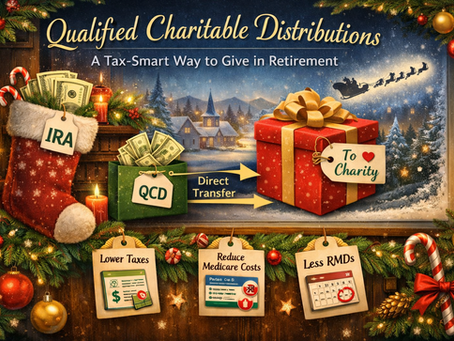top of page

Financial Grand Rounds
with Bryan Jepson, MD, CFP®
All Posts


Sequence Risk Isn’t Just About Retirement — It’s About Career Transitions
Why leaving clinical medicine can amplify volatility — even if your math works. Sequence risk is typically framed as a retirement math problem. But it’s often a life-timing problem. The real danger isn’t just poor early returns — it’s when volatility collides with income reduction and identity shifts. Anyone familiar with me from my website, blog articles or podcast appearances knows that I am a second shifter. "The Second Shift" is the name of a new podcast that I am co-ho
bryanjepson
3 days ago8 min read


Donor Advised Funds Explained: A Practical Guide to Tax-Efficient Charitable Giving
Donor Advised Funds: A smart tax strategy In my last post , I spoke about a great tax strategy for charitable giving called a Qualified Charitable Distribution , or QCD. QCDs allow you to lower your Adjusted Gross Income (AGI) dollar for dollar and still take advantage of the standard deduction (or itemize if it makes sense) for further reduction of your tax bill. The main problem with the QCD strategy is that it is available to a relatively small demographic: charitably
bryanjepson
Jan 307 min read


Qualified Charitable Distributions: One of the Most Overlooked Tax Strategies in Retirement
This week is Christmas, which feels like the perfect time to write a post about charitable giving. I recently worked with a retired client couple who were excellent candidates for a Qualified Charitable Distribution (QCD): are charitably minded, still have relatively high income (pension/social security/part-time employment), are required to take RMDs, and hold a meaningful balance in a traditional IRA. I introduced the concept to them and was able to save them thousands of d
bryanjepson
Dec 27, 20255 min read


Asset Location After You Retire: What Changes and Why It Matters
When most of us think about saving for retirement, we often start with a net worth goal—a number generated perhaps by a formula like the 4% rule or financial planning software. Once we hit that number, we figure, the work will be done. So, we put our heads down and earn, save, and invest diligently to achieve our retirement goal. These working years can also be called life’s accumulation phase. Well, the reality is that life doesn’t stop at retirement, and neither do th
bryanjepson
Dec 17, 20257 min read


What is one of the most overlooked investment strategies? Asset location
When most people think about “investment strategy,” they immediately jump to asset allocation —the mix of stocks, bonds, and alternative investments that matches their risk tolerance and time horizon. But there’s a second, equally important concept that rarely gets discussed outside of professional planning circles: Asset location. If asset allocation is what you invest in, asset location is where you place those investments. And getting this right can add tens of thousand
bryanjepson
Nov 26, 20257 min read


Winning the distribution phase: How to efficiently access your money when you retire
You’ve worked hard your entire career and made the right financial decisions to build a solid nest egg and to be positioned to retire on your own terms. But the accumulation phase in life is only half of the story. Now you have to start distributing and living off your assets. First, are you ready for that shift in mindset? It turns out that it is harder than you think. Second, do you know how to access your money in a logical and tax-efficient manner? These are common qu
bryanjepson
Nov 19, 20258 min read


What are Roth conversions—and how can they save you millions
One of the most powerful tools in the financial planning toolbelt in terms of tax strategy is called a Roth conversion. It is simply moving money from your pre-tax retirement accounts to your tax-free (or Roth) retirement accounts after you have stopped working and when you are in a lower income tax bracket. Let’s review how it works. Nest-egg buckets As you save, invest, and grow your retirement nest egg, there are three possible destinations, or buckets, where those asset
bryanjepson
Oct 23, 20258 min read


DIY vs. Using a Financial Advisor: How to Decide What’s Right for You
I’ve been a DIY investor for nearly three decades, and a financial advisor for almost three years. I’ve always enjoyed learning about investing and managing my own finances and, honestly, never seriously considered hiring a financial advisor before I became one myself. So why the career pivot? After many years in emergency medicine, I wasn’t mentally ready to retire — but I was ready for something different. I decided to dig deeper into my passions and see where that led. For
bryanjepson
Oct 11, 20256 min read


Are you confused about how bonds are priced? You’re not alone. Here’s how it works
In my last article , I talked about the basic types and terminologies of bonds. We learned about terms like coupon rates, par values, and maturities. The thing that used to confuse me most about bonds is their pricing. I would hear on the news that interest rates were up, and bond prices were falling. That didn’t really make sense to me. Wouldn’t higher interest rates make bonds more attractive? Actually, it’s the opposite. Today, I’ll explain how it all works. The tw
bryanjepson
Oct 2, 20256 min read


You likely have bonds in your portfolio. But do you understand how they work?
I was aware of bonds early in my investing career but will admit that I didn’t really know that much about them or how they actually worked until I took a basic financial management course as part of my master’s program in finance. I just knew that they paid out interest, were less volatile, and had lower growth potential than stocks. I was comfortable with the risk of the stock market and wanted the growth, so I didn’t have much interest in bonds and had very few in my por
bryanjepson
Sep 26, 20258 min read


Evaluating the bonds in your portfolio: Are they doing what you think they’re doing?
We all know that we need to invest to achieve our long-term financial goals, right? But are we confident in knowing how to invest? My last several blog posts have been about making smart decisions with your portfolio that will help you maximize your return, minimize fees, and manage your risk. Today, I’m going to talk about bonds—not the nuts and bolts of how they work, but how to decide if your selections are meeting your goals. Stocks or bonds? When we think about portfol
bryanjepson
Sep 5, 20256 min read


Investment Alpha and Beta Explained: How to Measure Portfolio Risk and Performance
In my last article, I pulled back the curtain on expense ratios —those “silent fees” that can drag down your portfolio without you noticing. But keeping costs low is only the first step in smart portfolio management . The next question is: how do you actually measure whether your portfolio is performing well? That’s where alpha and beta come in. These two simple metrics can show you not just how much you earned, but how much risk you took to get there. Passive vs Active Inv
bryanjepson
Aug 18, 20255 min read


Are Fees Eating Your Returns? What Every Investor Should Know About Mutual Fund Costs
As a financial planner, I review a lot of investment portfolios and have learned a few things by doing so. There are some common mistakes eating into portfolio returns that investors are unaware of or have just overlooked. Over my next few posts, I am going to discuss some ways that we can all be a little more careful with our portfolio selections. Today’s post is about paying attention to hidden fees, namely mutual fund expense ratios and sales loads. First, why do I refe
bryanjepson
Aug 6, 20256 min read


Do you know your net worth? Projecting it out can keep your financial goals on track.
Every quarter, public companies are required to report their finances to shareholders ad potential investors. These reports can significantly alter stock prices and company value if anything defies expectations, even slightly. The core of the financial report is a balance sheet, an income statement, and a statement of cash flows and then there are a lot of pages of explanations and projections. With personal finance, also, it is a good idea for you to generate similar fina
bryanjepson
Jul 21, 20254 min read


Budgeting is not a dirty word! Knowing what is coming and going is the key to your financial success.
I grew up in a household where making ends meet was always a struggle. When I look back on it, I am amazed at how my parents did it with their low income and five children to feed and clothe. We didn’t have much extra compared to many of my peers, but I never felt significantly deprived. The only way that could have happened is that my parents were really good at budgeting. And they still are! Now in their mid-80’s, they still live below their means even though their only s
bryanjepson
Jul 12, 20255 min read


Worried about overfunding a 529? Would a taxable account be better for college savings? I built a calculator to help you decide.
My last few blog posts have been all about saving for the rising cost of college education. First was a post about how to figure out how much you will need to save. The second post was about the various savings options. This post is a little bit different and will try to address the question: What happens if I have saved all this money in a 529 account and my child doesn’t end up using it? As a quick review, a 529 account is a state-administered college savings account wh
bryanjepson
Jul 4, 20253 min read


Saving for college: 529 plans and beyond
Having reaped the reward from investing in higher education, it is natural for physicians to hope for the same for their children. But the cost of that education continues to climb and climb. If we can make that road a little easier for our kids, we do it. In my last blog, I introduced a college education savings calculator that is available in the "financial tools" page on my website. This is an easy-to-use tool to figure out how much you need to save for your kids. Tod
bryanjepson
Jun 29, 20258 min read


Are you saving for kids to go to college? Check out my new savings calculator that does all the math.
Saving for higher education As people who understand firsthand the financial power of higher education, most physicians encourage their children to follow in their footsteps, at least to the level of a college degree. But that degree comes with a significant cost—an ever increasing one. If you are in the stage of life where you are saving for kids to go to college, looking years ahead to the cost of attendance can be jaw-dropping. If you don’t start early with a solid inve
bryanjepson
Jun 18, 20253 min read


The Investor Behavior Gap: Are your DIY behaviors hurting your returns, and is it worth paying an advisor to overcome them?
Behavior Gap: difference between expected and actual investor outcome I recently got an email from a fellow physician finance enthusiast/professional, Dr. Kenneth Kim. Kenny is a physician, an enrolled agent (EA), a professional tax strategist, and a blogger who does a great job teaching other doctors about taxes. I encourage you to check out his blog here . Anyway, he sent me a couple of interesting articles comparing the investment returns of the two major types of reti
bryanjepson
Jun 4, 20255 min read


Anchoring Bias: How the First Number You Hear Skews Financial Decisions
Doctor dragged down by anchoring bias Have you ever noticed how the first number you hear tends to shape everything that comes after it—whether it’s the price of a house, a job offer, or even your retirement target? That’s not just a quirk of human thinking; it’s a well-documented psychological phenomenon called anchoring bias. It affects our financial decisions more than we realize—quietly influencing what we think something should be worth, what we feel we deserve to earn
bryanjepson
May 25, 20255 min read
Disclaimer: The content in this blog is for educational purposes only and should not be considered financial advice. You should always consult with your own financial advisor to see how any of it would fit into your personal financial plan.
bottom of page


